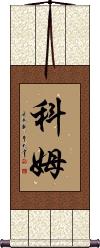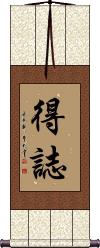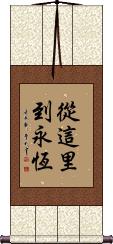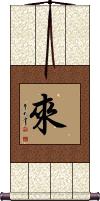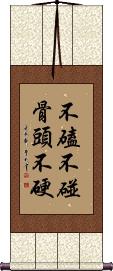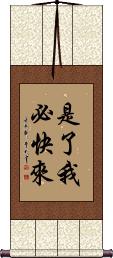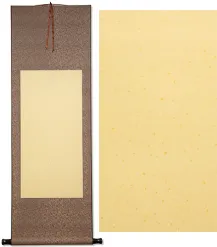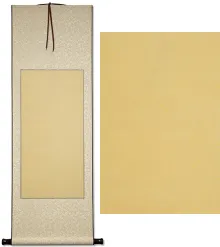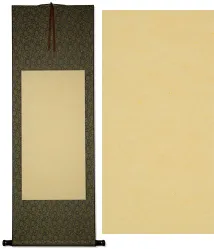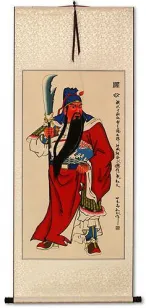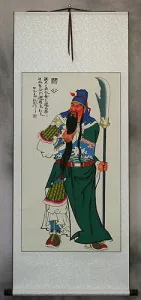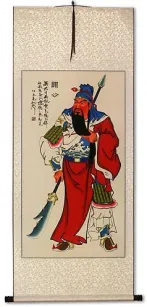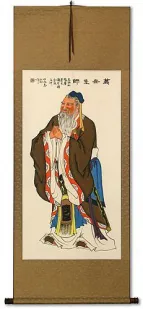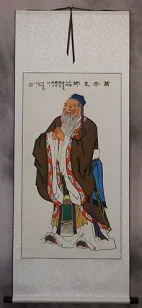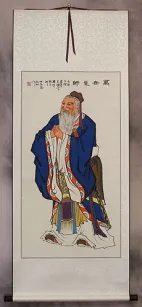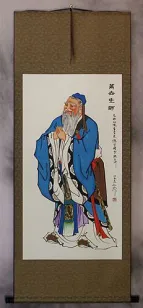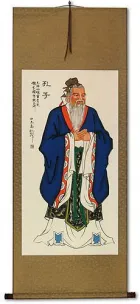Many custom options...
And formats...

The name Come Here in Chinese / Japanese...
Buy a Come Here calligraphy wall scroll here!
Personalize your custom “Come Here” project by clicking the button next to your favorite “Come Here” title below...
Switched to secondary search mode due to lack of results using primary.
These secondary results may not be very accurate. Try a different but similar meaning word or phrase for better results. Or...
Look up Come Here in my Japanese Kanji & Chinese Character Dictionary(My dictionary is a different system then the calligraphy search you just tried)
If you want a special phrase, word, title, name, or proverb, feel free to contact me, and I will translate your custom calligraphy idea for you.
1. Come
2. Even a fool may sometimes come up with a good idea
3. Dream Come True / Enjoy Success
Come
Even a fool may sometimes come up with a good idea
千慮一得 means “1000 tries, one success,” or “[a] thousand tries [leads to] one success.”
This proverb is a humble way to express your success, ideas, or accomplishments. As if you are a fool who just got lucky in inventing or creating something.
Translations for this proverb include:
Even without any notable ability on my part, I may still get it right sometimes by good luck.
Even a fool may sometimes come up with a good idea.
Compare this to the English idiom, “Even a broken clock is right twice a day.”
Dream Come True / Enjoy Success
From Here to Eternity
To Come / To Arrive
來 means to come or to arrive.
In Japanese, this can be the female given name Rai or the surnames Takagi or Kuru (and a few other rare names). Often written 来 instead of the original 來 in modern Japanese.
In the Buddhist context, this can mean the coming or refer to the future.
Strong bones come from hard knocks
不磕不碰骨頭不硬 is a Chinese proverb that literally translates as: Without being knocked around a bit, [one's] bones won't become hard.
Figuratively, this means: One can't become strong without first being tempered by “hard knocks.”
While true for everyone, this sounds like the “Iron Body” form of Kung Fu, where practitioners' bodies are beaten (and often bone fractured) in order to become stronger.
For the rest of us, this is just about how we can be tempered and build character through the hardships in our lives.
This is not a common title for a wall scroll in China.
Surely I come quickly
Part of Revelation 22:20
是了我必快來 is an excerpt from Revelations 22:20. It says “Surely, I am coming quickly” or “Surely I come quickly” depending on which Bible translation you use.
The Chinese translation here comes from the Chinese Union Bible which has been around for almost 100 years and is the standard for Chinese Christians.
This in-stock artwork might be what you are looking for, and ships right away...
Gallery Price: $90.00
Your Price: $49.88
Gallery Price: $83.00
Your Price: $45.88
Gallery Price: $200.00
Your Price: $79.88
Not the results for come here that you were looking for?
Below are some entries from our dictionary that may match your come here search...
| Characters If shown, 2nd row is Simp. Chinese |
Pronunciation Romanization |
Simple Dictionary Definition |
布施 see styles |
bù shī bu4 shi1 pu shih fuse ふせ |
More info & calligraphy: Dana: Almsgiving and Generosity(n,vs,vi) (1) {Buddh} alms-giving; charity; (n,vs,vi) (2) {Buddh} offerings (usu. money) to a priest (for reading sutras, etc.); (surname) Fuho dāna 檀那; the sixth pāramitā, almsgiving, i. e. of goods, or the doctrine, with resultant benefits now and also hereafter in the forms of reincarnation, as neglect or refusal will produce the opposite consequences. The 二種布施 two kinds of dāna are the pure, or unsullied charity, which looks for no reward here but only hereafter; and the sullied almsgiving whose object is personal benefit. The three kinds of dāna are goods, the doctrine, and courage, or fearlessness. The four kinds are pens to write the sutras, ink, the sutras themselves, and preaching. The five kinds are giving to those who have come from a distance, those who are going to a distance, the sick, the hungry, those wise in the doctrine. The seven kinds are giving to visitors, travellers, the sick, their nurses, monasteries, endowments for the sustenance of monks or nuns, and clothing and food according to season. The eight kinds are giving to those who come for aid, giving for fear (of evil), return for kindness received, anticipating gifts in return, continuing the parental example of giving, giving in hope of rebirth in a particular heaven, in hope of an honoured name, for the adornment of the heart and life. 倶舍論 18. |
まあ see styles |
maa / ma まあ |
(adverb) (1) just (e.g. "just wait here"); come now; now, now; (2) tolerably; passably; moderately; reasonably; fairly; rather; somewhat; (3) well...; I think...; it would seem...; you might say...; Hmmm, I guess so...; (interjection) (4) (feminine speech) oh!; oh dear!; oh, my!; wow!; goodness gracious!; good heavens! |
カメヤ see styles |
kameya カメヤ |
(archaism) Western dog (wasei: come here) |
来てる see styles |
kiteru; kiteru; kiteru きてる; キテる; キテル |
(exp,v1) (1) (abbr. of 来ている) (See 来る・1) to have come; to be here; (exp,v1) (2) (slang) (kana only) to be popular; to be fashionable; (exp,v1) (3) (slang) (kana only) (See 頭にくる・1) to be angry; to have blown one's lid |
さあさあ see styles |
saasaa / sasa さあさあ |
(interjection) (1) come, come; come; come now; (interjection) (2) here you go; here; when handing something |
Variations: |
kameya; kame カメヤ; カメ |
(archaism) Western dog (wasei: come here) |
一昨日来やがれ see styles |
ototoikiyagare おとといきやがれ |
(expression) (slang) Don't you ever come here again! |
既來之,則安之 既来之,则安之 see styles |
jì lái zhī , zé ān zhī ji4 lai2 zhi1 , ze2 an1 zhi1 chi lai chih , tse an chih |
Since they have come, we should make them comfortable (idiom). Since we're here, take it easy.; Since this is so, we should accept it.; Now we have come, let's stay and take the rough with the smooth.; If you can't do anything to prevent it, you might as well sit back and enjoy it. |
おととい来やがれ see styles |
ototoikiyagare おとといきやがれ |
(expression) (slang) Don't you ever come here again! |
Variations: |
ototoikiyagare おとといきやがれ |
(expression) (slang) don't you ever come here again!; come here the day before yesterday |
Variations: |
maa(p); maa(p); maぁ; ma / ma(p); ma(p); maぁ; ma まあ(P); まー(P); まぁ; ま |
(adverb) (1) (when urging or consoling) just (e.g. "just wait here"); come now; now, now; (adverb) (2) tolerably; passably; moderately; reasonably; fairly; rather; somewhat; (adverb) (3) (when hesitating to express an opinion) well...; I think...; it would seem...; you might say...; Hmmm, I guess so...; (interjection) (4) (feminine speech) oh!; oh dear!; oh, my!; wow!; goodness gracious!; good heavens! |
Variations: |
saa(p); saa(p); saぁ(sk) / sa(p); sa(p); saぁ(sk) さあ(P); さー(P); さぁ(sk) |
(interjection) (1) (used to urge or encourage others) come (on); come now; come along; here; (interjection) (2) (indicates resolve) all right; right; okay; now; here goes; (interjection) (3) (indicates uncertainty or hesitation) well; hmm; uh; let's see; I'm not sure; (interjection) (4) (said when something arrives, starts, finishes, etc.) here; now; there (we go); ah; oh; (interjection) (5) (used when interrupting someone) about that, ...; actually, ... |
The following table may be helpful for those studying Chinese or Japanese...
| Title | Characters | Romaji (Romanized Japanese) | Various forms of Romanized Chinese | |
| Come | 科姆 | kē mǔ / ke1 mu3 / ke mu / kemu | k`o mu / komu / ko mu | |
| Even a fool may sometimes come up with a good idea | 千慮一得 千虑一得 | senryonoittoku | qiān lǜ yī dé qian1 lv4 yi1 de2 qian lv yi de qianlvyide | ch`ien lü i te chienlüite chien lü i te |
| Dream Come True Enjoy Success | 得誌 得志 | dé zhì / de2 zhi4 / de zhi / dezhi | te chih / techih | |
| From Here to Eternity | 從這里到永恆 从这里到永恒 | cóng zhè lǐ dào yǒng héng cong2 zhe4 li3 dao4 yong3 heng2 cong zhe li dao yong heng congzhelidaoyongheng | ts`ung che li tao yung heng tsungchelitaoyungheng tsung che li tao yung heng |
|
| To Come To Arrive | 來 来 | rai / takagi / kuru | lái / lai2 / lai | |
| Strong bones come from hard knocks | 不磕不碰骨頭不硬 不磕不碰骨头不硬 | bù kē bù pèng gǔ tóu bù yìng bu4 ke1 bu4 peng4 gu3 tou2 bu4 ying4 bu ke bu peng gu tou bu ying bukebupenggutoubuying | pu k`o pu p`eng ku t`ou pu ying pukopupengkutoupuying pu ko pu peng ku tou pu ying |
|
| Surely I come quickly | 是了我必快來 是了我必快来 | shì le wǒ bì kuài lái shi4 le wo3 bi4 kuai4 lai2 shi le wo bi kuai lai shilewobikuailai | shih le wo pi k`uai lai shihlewopikuailai shih le wo pi kuai lai |
|
| In some entries above you will see that characters have different versions above and below a line. In these cases, the characters above the line are Traditional Chinese, while the ones below are Simplified Chinese. | ||||
Successful Chinese Character and Japanese Kanji calligraphy searches within the last few hours...
